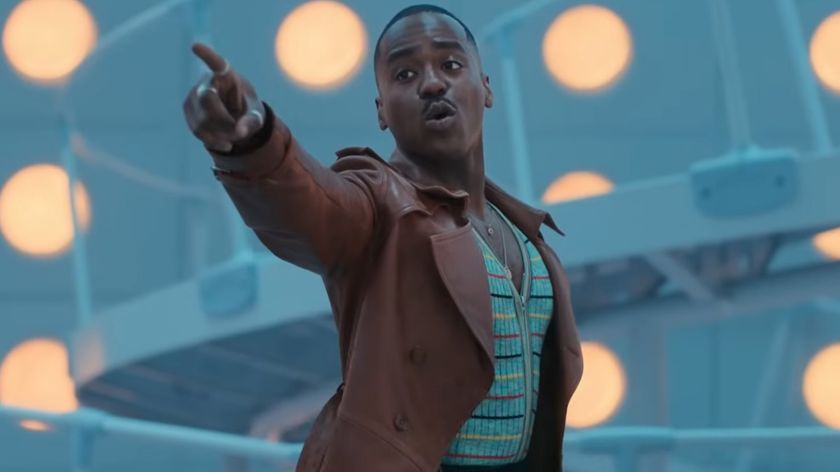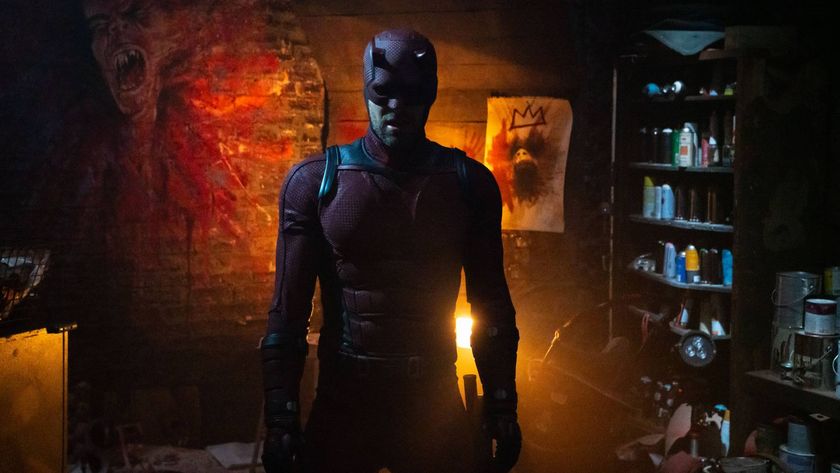Isnt It About Time You Gave Mirrormask Another Chance?
None
Lee Harris gives the case for and against Neil Gaiman and Dave McKean’s attempt to create a modern fairy tale
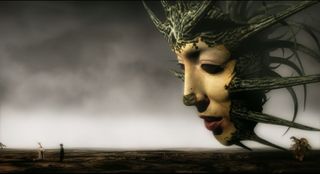
Prosecution : M’lud, today we present 2005’s Mirrormask . In this jumbled mess of a movie we have a clear case of style over substance, of ambition over experience , of…
Defence: Rhetoric over facts?
Prosecution: If you’d kindly let me continue? There is no doubt that Dave McKean has produced some of the more visually interesting books of the last decade, ably supported by Neil Gaiman’s confident prose (and sometimes verse), but their leap from page to screen has been a disappointment. A slow-moving, often incoherent, fantasy in which the live action and CG animation are at odds.
Defence: Well, you know I’ll be objecting to pretty much every point you make, but you’ve already admitted that MirrorMask is a stylish film. Del Toro’s work aside, It would be difficult to find another film of the last 20 years with a tenth of the visual artistry.
Prosecution: I don’t deny that the film looks good on the surface, but a successful movie needs more than just attractive backdrops.
Defence: But it does have more. For one thing, it boasts an extremely talented cast. Gina McKee is incapable of turning in a poor performance, and doesn’t disappoint in any of her three roles. Jason Barry as Valentine is wonderful as the friendly-though-ultimately-weak companion – and unlike most comedy relief he doesn’t make you want to throw a brick at the screen! And Stephanie Leonidas excels as Helena and the Dark Princess – she really is one of the most underrated actresses in the UK.
Sign up to the SFX Newsletter
Get sneak previews, exclusive competitions and details of special events each month!
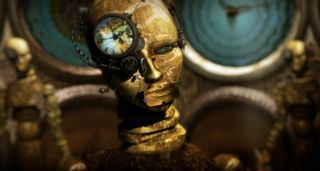
Prosecution: And Rob Brydon.
Defence: Even Brydon’s admittedly rather strained performance could be interpreted as the desperation of a man at the end of his tether…
Prosecution: Seriously?
Defence: Ok, I’ll give you Brydon, but he’s not in it that much. The film is largely a two-hander, with Leonidas and Barry supported by veritable armies of McKean’s creation, and it’s their relationship that drives the action. And there’s plenty of action!
Prosecution: We’ll come back to that point in a moment, I still want to talk about the visuals.
Defence: Well, this will be an easy win for me, then.
Prosecution: Don’t be so sure. I said the film looks good on the surface . Look deeper, and you notice the cracks. Most of the film was filmed in front of a green screen, with backgrounds and supporting characters added in later through liberal use of CGI. This has inevitably led to the film looking like a cardboard puppet theatre, albeit a well-designed one. You never quite believe that the characters are inhabiting this land.
Defence: And why should you? Throughout the film, Helena is never quite sure if she has been transported to a strange new land, or if she’s merely dreaming. The fact that the characters never quite look rooted in their surroundings only supports her – and by extension the viewers’ – uncertainty. Now, let’s get back to the action.
Prosecution: Oh, yes – the “action”.
Defence: Objection, M’Lud – the prosecution just made that annoying “quote” sign with his fingers.
Judge: Sustained. Do try not to look like an idiot, if you can.
Prosecution: Apologies, M’Lud. Won’t happen again. So, by all means let’s talk about the action in the movie. At no point do we feel that Helena is in control of her fate. She’s merely swept along from set piece to set piece.
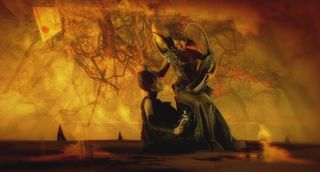
Defence: That’s simply not true. When she enters Giants Orbiting , for instance, she takes control as soon as the sphinx arrives, throwing it off-guard, and rushing to the floating giants. If she sometimes seems to go with the flow, that can easily be explained by her being in an unfamiliar environment – one in which she doesn’t understand the rules.
Prosecution: Pah! That’s a poor excuse. A strong protagonist would at least attempt to take full control and not merely react to everything put in her path.
Defence: But put yourself in her position. She’s a stranger in a strange land – of course she’s going to spend some of her time reacting to her new environs.
Prosecution: It may be realistic, but it’s not satisfying to watch. And her inability to act fully on her own initiative contributes to another flaw in the movie – pace. Despite just being a little over 90 minutes, this is a slow movie.
Defence: Are you kidding? So much happens in the last hour you wonder how the filmmakers managed to fit it all in! There are eyeball spiders, floating giant lovers, sentient darkness, sphinxes, sphinx-like cats, as well as all manner of other oddball creatures and people.
Prosecution: And part of the problem is that it all happens in the last hour. We don’t even get to see the City of Light until more than twenty minutes into the movie, and with a film like this, that’s the biggest draw.
Defence: You’re seriously arguing that the film is flawed because it introduces characters and setting, rather than jumping straight into the action? If it did head straight for the jugular you’d be complaining that it was too confusing. Gaiman’s script is scary where it needs to be, funny where appropriate, and contains dialogue as good as anything Whedon ever committed to film.
Prosecution: What about the antagonists? You never get the impression that everyone is working toward the same goal, or even that there is a goal, except for Helena’s pursuit of the MirrorMask. Certainly, the bad guys don’t appear to be in any great rush, and as the Big Bad of the film just wants to have Helena around, rather than kill or imprison her, it’s difficult for the viewer to get too worried about our heroine’s fate. And while individual set pieces do look beautiful, the interlinking scenes add nothing to our understanding of Helena or her goal. And as for the music …
Defence: He’s having a go at the birds, now…
Prosecution: What?
Defence: You can’t seriously condemn the incidental music? Ian Bellamy’s soundtrack was unique, and unlike anything you’ll hear in any other movie.
Prosecution: Different doesn’t necessarily mean good, you know!
Defence: So the music wasn’t good? Is that really your argument? Think carefully before you answer…
Prosecution: No, I’m not saying the music wasn’t good, just that it was too intrusive. The sound editor was far too fond of volume. It would have worked a lot better if the soundscape had slipped into the background a little more, instead of demanding our attention when we should be enthralled by the storyline and visuals.
Defence: So you admit the visuals and storyline were enthralling, then!
Prosecution: I’ll admit that it was an interesting attempt at creating a modern fairy tale, and it was visually unique. M’Lud, MirrorMask was filmed on a miniscule budget by an inexperienced director, and while it looks pretty, it never quite reaches the classic heights it aspires to. It could have been a classic movie, but – visuals aside – it merely disappoints.
Defence: My learned friend is correct in that the film isn’t an instant classic, and he has already admitted – several times – that the visuals are stunning. It’s a film with huge ambition, and an extremely talented cast. It’s never less than interesting, and often fascinating. By any definition, that’s a successful movie.
Judge: It is clear to me that the Prosecution has no romance in his soul. Case dismissed.
Check out our other Isn’t It About Time features
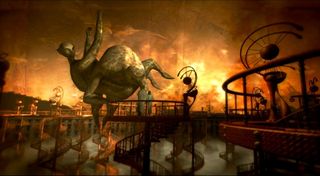
Most Popular





